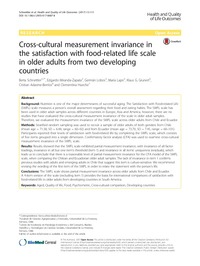Mostrar el registro sencillo de la publicación
Cross-cultural measurement invariance in the satisfaction with food-related life scale in older adults from two developing countries
| dc.contributor.author | Schnettler, Berta | |
| dc.contributor.author | Miranda-Zapata, Edgardo | |
| dc.contributor.author | Lobos, Germán | |
| dc.contributor.author | Lapo, María del Carmen | |
| dc.contributor.author | Grunert, Klaus G. | |
| dc.contributor.author | Adasme-Berríos, Cristian | |
| dc.contributor.author | Hueche, Clementina | |
| dc.date.accessioned | 2017-12-04T15:47:42Z | |
| dc.date.available | 2017-12-04T15:47:42Z | |
| dc.date.issued | 2017 | |
| dc.identifier.uri | http://repositorio.ucm.cl/handle/ucm/1558 | |
| dc.description.abstract | Background: Nutrition is one of the major determinants of successful aging. The Satisfaction with Food-related Life (SWFL) scale measures a person’s overall assessment regarding their food and eating habits. The SWFL scale has been used in older adult samples across different countries in Europe, Asia and America, however, there are no studies that have evaluated the cross-cultural measurement invariance of the scale in older adult samples. Therefore, we evaluated the measurement invariance of the SWFL scale across older adults from Chile and Ecuador. Methods: Stratified random sampling was used to recruit a sample of older adults of both genders from Chile (mean age = 71.38, SD = 6.48, range = 60–92) and from Ecuador (mean age = 73.70, SD = 7.45, range = 60–101). Participants reported their levels of satisfaction with food-related life by completing the SWFL scale, which consists of five items grouped into a single dimension. Confirmatory factor analysis (CFA) was used to examine cross-cultural measurement invariance of the SWFL scale. Results: Results showed that the SWFL scale exhibited partial measurement invariance, with invariance of all factor loadings, invariance in all but one item’s threshold (item 1) and invariance in all items’ uniqueness (residuals), which leads us to conclude that there is a reasonable level of partial measurement invariance for the CFA model of the SWFL scale, when comparing the Chilean and Ecuadorian older adult samples. The lack of invariance in item 1 confirms previous studies with adults and emerging adults in Chile that suggest this item is culture-sensitive. We recommend revising the wording of the first item of the SWFL in order to relate the statement with the person’s life. Conclusions: The SWFL scale shows partial measurement invariance across older adults from Chile and Ecuador. A 4-item version of the scale (excluding item 1) provides the basis for international comparisons of satisfaction with food-related life in older adults from developing countries in South America. | es_CL |
| dc.language.iso | en | es_CL |
| dc.rights | Atribución-NoComercial-SinDerivadas 3.0 Chile | * |
| dc.rights.uri | http://creativecommons.org/licenses/by-nc-nd/3.0/cl/ | * |
| dc.source | Health and Quality of Life Outcomes, 15, 113 | es_CL |
| dc.subject | Aged | es_CL |
| dc.subject | Quality of life | es_CL |
| dc.subject | Food | es_CL |
| dc.subject | Psychometric | es_CL |
| dc.subject | Developing countries | es_CL |
| dc.subject | Cross-cultural comparison | es_CL |
| dc.title | Cross-cultural measurement invariance in the satisfaction with food-related life scale in older adults from two developing countries | es_CL |
| dc.type | Article | es_CL |
| dc.ucm.facultad | Facultad de Ciencias Sociales y Económicas | es_CL |
| dc.ucm.indexacion | Scopus | es_CL |
| dc.ucm.indexacion | Isi | es_CL |
| dc.ucm.doi | doi.org/10.1186/s12955-017-0687-8 | es_CL |



